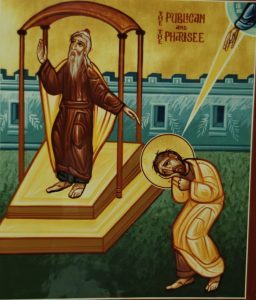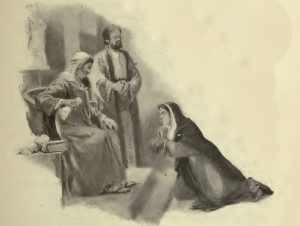Gary Neal Hansen's Blog, page 23
December 5, 2019
Monday Meditation: RCL Year A, Advent 2, Matthew 3:1-12

 Fried Crickets in Cambodia, CC by Thomas Schoch-SA 2.5
Fried Crickets in Cambodia, CC by Thomas Schoch-SA 2.5Locusts & Honey. Mmm…
 Camel’s Hair Jacket. Bill Blass 2009, CC by congaman (Dave) 2.0
Camel’s Hair Jacket. Bill Blass 2009, CC by congaman (Dave) 2.0It’s easy to get sidetracked by the odd details about John the Baptist: He wore that stylish camel’s hair jacket with a nice leather belt. And he ate a high protein diet featuring insects — and like the kid’s poem about keeping peas on one’s knife, John improved their taste with a touch of honey.
John comes up because on the Second Sunday of Advent we take a giant step backward in our waiting for Jesus.
Remember that on Advent 1 the lectionary placed us in the present, waiting for the return of Jesus at the end of the age. This week we jump back to waiting for his earthly ministry. We are with John the Baptist on the banks of the Jordan, awaiting Jesus’ baptism.
Matthew 3:1-12
Jesus doesn’t appear in Matthew 3:1-12. It’s Advent, after all. We’re waiting.
The focus is on John the Baptist’s ministry — but John had an Advent sort of ministry. That is, John’s own focus was on preparing the people for the coming of his cousin.
More importantly, however, we need to pay attention to his message.
The Way of Repentance
John preached a call to action:
Repent,
for the kingdom of heaven has come near.” (Matthew 3:2 NRSV)
The word points to inner change: the literal meaning of the word translated “repent” is to change your mind. You might say John called the people to find a new way of thinking.
But that inner change is more than shifting your opinions. It is about core change in our being, leading to change of who we are in the world. You get a sense of that in Matthew’s explanation that John was fulfilling a prediction of the prophet Isaiah. He says John was
The voice of one crying out in the wilderness:
‘Prepare the way of the Lord,
make his paths straight.’” (Matthew 3:3 NRSV)
There’s a metaphor of major construction in those words. Out in the untamed wilderness of our lives we are to make a path, a road, for the Lord to travel on. We need to make it a straight shot so he can reach his destination quickly and easily.
So the call in John the Baptist’s Advent message is to do what we need to do to make sure Jesus can reach us. Don’t leave him wandering out there in the wasteland. Get organized. Build a road.
And the people listened to John’s message. They tried to do just what he said by coming out to meet him. They admitted that they had done bad things, and got symbolically washed of their accrued filth in the Jordan.
The Call to Bear Fruit
Take note, however, that John clearly wanted more than symbolic action. There is that implicit major construction project in Matthew’s quotation from Isaiah. But there is also evidence from John’s own mouth.
The people came out in great numbers. John saw the very religious (and I’d argue that in significant ways that means the very faithful) among them. Maybe that was all who came — only the Pharisees and Saducees are named. John greeted them with insults:
You brood of vipers!
Who warned you to flee
from the wrath to come?” (Matthew 3:7 NRSV)
That should have gotten their attention. (Or more likely, it raised the hackles of their anger. I don’t think the ancients would grade John well for rhetorical strategy.)
Then comes the call to more than symbolic action:
Bear fruit worthy of repentance.” (Matthew 3:8 NRSV)
He pointed to specific problematic attitudes they needed to retool, like thinking they were okay because of their genetic connection to the founders of the faith. And he gave them some harsh, apocalyptic warnings about the Lord’s axe being ready to cut them down like trees, and the Lord’s winnowing fork being ready to sort their wheat from their chaff.
But the main thing is the beginning of the agricultural metaphor:
Bear fruit worthy of repentance.” (Matthew 3:8 NRSV)
They aren’t just to build a straight road for Jesus through their hearts’ wilderness. If they profess repentance and receive baptism, they need to be like healthy fruit trees — they have to produce something useful; something tasty.
So repentance is indeed a change of mind, but it needs to work its way outward in a change of behavior — a life the is fit for God’s kingdom. After all, that’s the core of his preaching:
Repent,
for the kingdom of heaven has come near.” (Matthew 3:2 NRSV)
The One for Whom We Prepare
But neither John’s riverbank congregation nor we today should think the whole thing is just about us changing our own behavior.
Both the inner change of repentance and the outward change of fruitful life are about receiving the One who was then alive in Judea and about to come for baptism and begin his public ministry.
I baptize you with water for repentance,
but one who is more powerful than I is coming after me;
I am not worthy to carry his sandals.
He will baptize you with the Holy Spirit and fire.” (Matthew 3:11 NRSV)
It is easy to stop short of the point of Advent when we look at this text. We think it is all about repentance (which is surely a good thing), or that it is all about baptism (which is an excellent thing as well).
Don’t fail to note that all the repenting and all the baptizing are about making ready for Jesus.
We need Jesus who brings us the Holy Spirit to make us newer than our own repentance ever could.
We need Jesus who brings the refiner’s fire to really remove the impurities and make us finally shine like gold, reflecting his true image.
And that’s what Advent is all about.
++++++++++++
I’d love to send you my Monday Meditations, as well as my other new articles and announcements. Scroll down to the black box with the orange button to subscribe, and they’ll arrive most Fridays by email.
The post Monday Meditation: RCL Year A, Advent 2, Matthew 3:1-12 appeared first on Gary Neal Hansen.
November 29, 2019
Monday Meditation: RCL Year A, Advent 1, Matthew 24:36-44

 By permission of Pexels site
By permission of Pexels siteHey, this Sunday is the beginning of Advent!
If you take your cues from the general culture you might think we were well into Christmas. The stores have been selling decorations and playing Christmas music since the day after Halloween.
But the church doesn’t begin the 12 days of Christmas until December 25. The four Sundays of Advent are all about getting ready for a Christmas that is still in the future.
And really, when you think about the world-changing importance of Christmas, we do well to take the time to get ready. After age upon age of speaking to us from afar, at Christmas God comes among us, born in human flesh.
That fact in itself is at the heart of salvation message. Not just that the message Jesus speaks is authoritative, but the fact that God came in person at all.
 St Athanasius of Alexandria, Sozopol Bulgaria, 17th Century
St Athanasius of Alexandria, Sozopol Bulgaria, 17th CenturyAs St. Athanasius portrayed it so well in the 4th century, the incarnation embodies the solution to our great problem. Ever since Eden, the image of God has been damaged in each of us and in humanity as a whole. Sin turned us from our journey toward God and Life, aiming us instead for death and destruction — we all die, and the grave reduces us to our elemental dust.
Athanasius portrays us as the damaged painting of God’s image. How will the beauty of God’s precious creation be restored? Jesus, who IS the image of God, comes among us, and the Father takes him as the model to repaint us IN his image. Our broken nature is repaired. Instead of leaving us lost, Jesus reorients us so we can make our way back to God. So Jesus coming IS our salvation — all in advance of his death on the cross or his resurrection at Easter.
(If you want some Advent reading, try Athanasius’ great work On the Incarnation of the Word. Here’s an affiliate link to get it on Amazon.)
Matthew 24:36-44
So always, when Advent comes, the Lectionary doesn’t jump to Bethlehem. We get a long ramp-up: We expect Mary to be going into labor, but instead Advent 1 starts where we are — here in the 21st century, wondering how long, O Lord, will the craziness go on? When will Jesus come again — at the end of the age.
It takes effort for us to turn our attention to the true significance of Christmas.
Moving from our present struggles to the babe in the manger is like a carpenter taking a stiff straight piece of wood and bending it into the curving base for a rocking chair. That change takes heat, humidity, pressure, and time. It will take both effort and patience to bend our attention to the importance of Jesus coming as a child. So we start the journey to Bethlehem by tending to our longing for salvation here, now.
(Actually we were in the same scene just two weeks ago, but we’ve switched from Luke’s version to Matthew’s as “Year A” of the lectionary begins.)
The Bit We Like
This little passage has a good dose of the kind of tantalizing end-times prediction that Christians love to glom onto.
Then two will be in the field;
one will be taken
and one will be left.
Two women will be grinding meal together;
one will be taken
and one will be left.” (Matthew 24:40-41 NRSV)
Often Christians focus on this bit and talk of “the rapture.” Too often we use it to scare people into conversion with fears of being “left behind.” To wit, listen the 1969 recording of early Christian Rocker Larry Norman singing “I Wish We’d All Been Ready” (with unrelated grainy background video of Norman in action.)
Personally I think part of the draw is that the scary stuff lets us be the insiders. We are the ones who know, the ones who choose to follow Jesus, the ones who are safe. When life so often points out our powerlessness, our lack of necessary knowledge, all in the midst of looming danger, it helps to be an insider in the Big Picture things. It’s strangely comforting.
However, the risk of being an insider is we find ourselves almost inexorably drawn to matching up the predictions with the headlines. We assume that being truly ready means figuring out exactly when Jesus is coming.
The Bit We Miss
Better, though to read this evocative image in context. If we don’t, we miss the points Jesus was trying to make.
Jesus did include the scary image of being either taken or left, but he adamantly emphasized something else: we are not intended to know when he’s coming.
Why do I say this was more emphatic? Because he made the point repeatedly, in different words:
But about that day and hour no one knows,
neither the angels of heaven, nor the Son,
but only the Father.” (Matthew 24:36 NRSV)
You know the old expression, “God only knows”? Well when it comes to the second coming of Christ, God only knows.
Seems clear enough. We shouldn’t think we can put the puzzle pieces together because even Jesus doesn’t know when he will be back.
Still don’t believe him?
For as in those days before the flood …
they knew nothing until the flood came and swept them all away,
so too will be the coming of the Son of Man.” (Matthew 24:38-39 NRSV)
There’s his historical precedent: In the story of Noah, the great flood surprised everybody but Noah. And that’s the way it’s gonna be again, he says.
Still don’t believe him?
Then comes the scary stuff about being left or taken. But look at the point he drew from that:
for you do not know on what day your Lord is coming.” (Luke 24:42 NRSV)
Still not convinced?
Check out the little parable about the owner of the house who didn’t know when the thief would rob him, and it’s final point:
for the Son of Man is coming at an unexpected hour.” (Luke 24:44 NRSV)
So if you find yourself tempted to sort out the mysterious apocalyptic images to get a clear sense of when Jesus is coming, take note of this passage:
Jesus points out that
people in Noah’s time didn’t know,
you and I don’t know,
the angels don’t know,
Jesus himself doesn’t know,
and the one thing we all do know is that it’s gonna be a surprise.
Give it up. Okay?
The Other Bit We Were Supposed to Pay Attention To
So what are we supposed to be doing in the meanwhile? That’s the bit we are supposed to be paying attention to here.
After the story of being taken or left, because we don’t know when he’s coming he tells us
Keep awake therefore” (Matthew 24:42)
And again, after the parable of the homeowner who didn’t know when he’d be robbed, he tells us
you also must be ready” (Matthew 24:44)
Too often we succumb to the false idea that being ready means being obsessed: it supercharges many Christians’ desire to predict the Lord’s coming.
But the goal is to stay alert, awake, ready.
Keep Awake. Be Ready.
But what does that mean, practically? We should think of ourselves like the servants on the country estate of a rich noble family in an old English novel.
The Family lives elsewhere, at their main house. But they come traveling from time to time — and they don’t always send word of their plans.
Some of their servants stay at the country estate to keep it clean and in good repair, to protect it from vandals, to tend the grounds and gardens. They are supposed to keep it ready for the owners.
Then, whether the family arrives in the morning or the evening, on any day of the year, the servants are ready.
They don’t have to get obsessed. They just have to do their jobs.
So that’s my Advent 1 message to you from this text: Don’t try to predict when he’s coming. Instead, do what you need to do to remain awake and ready for your Lord’s return.
Keep awake and alert and growing in your spiritual life by renewing your practices of prayer and engagement with Scripture.
Keep awake and alert in your Christian community by finding ways to connect and grow in relationship.
Keep awake and alert, participating in your Lord’s work, reaching out and caring for those in need — whether they need to hear the gospel or to be welcomed to a meal.
++++++++++++
A great way to make Advent a time of being awake and ready would be to join my online course on classic lectio divina. Learn a way to prayerfully engage with Scripture that Christians have practiced for at least 1500 years. We’ll explore the classic form of the practice, journeying together through four great Advent texts from Luke.
Last chance to check it out! Registration closes Sunday December 1st at Midnight.
The post Monday Meditation: RCL Year A, Advent 1, Matthew 24:36-44 appeared first on Gary Neal Hansen.
November 21, 2019
Monday Meditation: RCL Year C, The Reign of Christ/Proper 29(34), Luke 23:33-43

 Crucifixion in a Musical, CC by bigbirdz 2.0
Crucifixion in a Musical, CC by bigbirdz 2.0This is the last Sunday in the Western Church year — the celebration of “The Reign of Christ” or, as we used to call it, “Christ the King.” Thus ends our hopscotch sojourn through Luke. It’s been fun. I’ll be back with Monday Meditations Mostly on Matthew in the wink of an eye.
Luke 23:33-43
At first glance (and maybe second as well) the Revised Common Lectionary’s choice of Gospel text may seem surprising: On “Christ the King” we have Luke 23:33-43. It looks like Jesus’ most singularly non-royal moment: Christ is on the cross, only three verses before his death.
He has been stripped by his executioners and they are gambling over his clothes as he watches from above. He gets mocked and ridiculed by each group in turn: leaders (v. 35), soldiers (v. 36-37), and even one of the criminals crucified beside him (v. 39).
Did the committee behind the lectionary make a grand mistake? Or did they have a particular insight?
Operatic Drama
To me this scene in Luke’s Gospel has the kind of drama you experience if you go to the opera. I’ve been to quite a number of them, though I’m not a big fan. The cast is often placed around the stage in a kind of tableaux, all to frame the singing of solo and group pieces, which are stitched together into a semblance of dialogue.
Walk. Pose. Sing. Gesture. Sing.
But nothing against opera. I bring up the topic because it gives me a way to envision the scene.
Upstage center, Christ on the Cross.
On either side, convicted criminals on their own crosses — surely a bit lower than that of Jesus.
There are little groups of leaders and soldiers artfully placed.
We, the audience sitting in the house, are the crowd standing by, watching the action. We know that this is a big event. Jesus has made lots of waves. Now he’s vulnerable.
Luke stages it all carefully.
One by one, the singers step downstage toward the audience to sing their arias. They glance back at Jesus but they are really playing to the crowd.
He identifies each singer:
Leaders.
Soldiers
A criminal.
He names each one’s attitude:
Scoffing.
Mocking.
Deriding.
He quotes their words:
The scoffing leaders say,
He saved others;
let him save himself
if he is the Messiah of God,
his chosen one!” (Luke 23:35 NRSV)
Then come the mocking soldiers:
If you are the King of the Jews,
save yourself!” (Luke 23:37 NRSV)
Finally from his cross, the deriding criminal:
Are you not the Messiah?
Save yourself
and us!” (Luke 23:39 NRSV)
The speeches are sarcastic. Thought they say “king” and “messiah”, the words declare the opposite: this man on the cross is, for all eyes to see, powerless, condemned, doomed.
The Sign
But then, as we sit in our comfortable seats in the opera house, between the solos we notice an element of the set we had previously missed — the sign.
It was right there all the time, on the top of Jesus’ cross. Each time a singer looked back to him, our eyes were directed right toward it:
There was also an inscription over him,
‘This is the King of the Jews.’” (Luke 23:38 NRSV)
You know how people are always looking for a sign? This is it.
That proclamation of the reign of Christ is firm and fixed, a declaration without an insinuation. It was put there by the waffling Pontius Pilate, who earlier in the chapter declared Jesus innocent but lacked the courage to deny the crowd the blood they begged for.
(That was us. Don’t forget that we are the crowd in this production.)
Once we see it, we read the whole scene through that sign. That’s why this is our text for Christ the King. The whole text tells us that he really is — no matter how many mockers say otherwise.
Reading Backwards
Because it is really a text rather than an opera, we can stop and ponder the scene. We do best to sort of read it backwards.
Start with the final moment, where the penitent thief chastises the critic hanging on the other side of Jesus, and begs, prays really, for Jesus to accept him
…when you come into your kingdom.” (Luke 23:42 NRSV)
Note whose eyes are opened: it’s the one who admits his guilt who sees that the one on the center cross really is the king.
And note that Jesus doesn’t quibble for an instant.
Truly I tell you,
today you will be with me in Paradise.” (Luke 23:43 NRSV)
That’s the statement of a king who knows he’s about to be back on his throne. He’s confident without a moment of bragging. He’s generous — he knows it is fully within his power to reward this man’s kindness.
So by the end we know that Jesus is truly kingly — despite the cross and the mockery.
And perhaps we begin to wonder if his true kingly character is shown even in and because of his willingness to endure these things.
Then we look back a few verses and we see that sign. Pilate knew and declared Jesus to be king before Jesus was nailed to that cross. We should have noticed it too.
Then we go back all the way to the start, when the nails had just pierced Jesus’ hands and feet. What did he say when they lifted him up to die?
Father, forgive them;
for they do not know what they are doing.” (Luke 23:34 NRSV)
The opera might have left us thinking only the truly penitent one can receive Jesus promise of grace. By reading backwards, knowing from the end that he is truly the gracious king, we can finally see the good news that was there from the beginning: Our king, whom we as the crowd demanded to be executed, forgives even us.
We had no idea at the time. We were being jerks. We went along with the others. We were blinded — maybe willfully so. But our king is so very full of grace, so very generous, that even in his darkest hour he welcomes us, even us, into his kingdom.
++++++++++++
My online course for Advent, exploring the ancient prayerful approach to Scripture called lectio divina is now open for registration! Click here for full info or to sign up.
The post Monday Meditation: RCL Year C, The Reign of Christ/Proper 29(34), Luke 23:33-43 appeared first on Gary Neal Hansen.
November 14, 2019
Monday Meditation: RCL Year C, 23rd Sunday after Pentecost/Proper 28(33), Luke 21:5-19

 cc by Robert Couse-Baker 2.0
cc by Robert Couse-Baker 2.0Sunday’s Gospel reading from the Revised Common Lectionary jumps one step forward in Luke to chapter 21. We haven’t been there since the first Sunday of Advent.
Almost the whole chapter is apocalyptic stuff. You know: “The End is Near!” — maybe. This week’s text, Luke 21:5-19, is the start of Jesus’ discourse on the coming of the end. I find that a careful journey through it tends to calm and sooth the anxious soul.
Luke 21:5-19
When some were speaking about the temple,
how it was adorned with beautiful stones and gifts dedicated to God,
he said,
‘As for these things that you see,
the days will come when
not one stone will be left upon another;
all will be thrown down.’” (Luke 21:5-6 NRSV)
The rest of the conversation will spin inexorably to end times stuff. I think here at the start Jesus was just trying to get his friends to remember their mortality, and the inevitability of change and destruction. We know it when we look around: the best things in our society, our highest ideals and the institutions that seek to make for a good and peaceful world, are crashing to the ground.
They asked him,
‘Teacher,
when will this be,
and what will be the sign
that this is about to take place?’” (Luke 21:7 NRSV)
Whatever Christ’s intention, Christians are obsessed with eschatology — and clearly have been since before they were called Christians. “Tell us when! How will we know! What should we be watching for!”
And he said,
‘Beware that you are not led astray;
for many will come in my name and say,
“I am he!”
and,
“The time is near!”
Do not go after them.
‘When you hear of wars and insurrections,
do not be terrified;
for these things must take place first,
but the end will not follow immediately.’” (Luke 21:8-9 NRSV)
Jesus begins to warm to the topic, but notice that he tries hard to get his disciples to cool off.
Beware that you are not led astray… Do not go after them… the end will not follow immediately.
Jesus points to two kinds of false Christian leaders — they come in his name, but we should beware.
First are those who say “I am he!”
You know: the kinds of leaders who woo Christians to foolish devotion by claiming to be the “king of Israel,” or “the second coming of God.” It turns out to be pretty easy, if you get wealth and the reins of power, to get Christians to believe that you are God’s anointed, no matter how openly sinful, corrupt, and contrary to core Christian teachings you are.
We’re actually most familiar with these false Christs from small-scale cultish groups. The lonely and disaffected eagerly follow pseudo-messiahs who lead their followers to poverty, sexual debauchery, criminality, even suicide.
But it seems quite possible for Christians to affirm the self-proclaimed messianic leadership of those who make such claims on a grand scale. You see a range of it historically — anywhere from those who sent millions to death camps or killing fields to those who destroy the families of asylum seekers, putting their children into cages.
Don’t follow them. Look at what they actually teach and do. If they don’t inspire the deeper love of God, and the kind of love of neighbor that makes sacrifices to help the poor and the oppressed and the stranger, they aren’t God’s anointed.
Second are those who say “The time is near!”
These are much more familiar. Their books become best sellers, no matter how differently each generation’s writers mash up current politics and apocalyptic prediction.
We Christians are just so titillated, so tantalized, by the symbols of biblical apocalyptic literature. It helps us feel smart, like insiders in an ignorant world. Who wouldn’t want to be the ones who know the secrets, who see with clear eyes that the end is coming now, in our generation, like next Wednesday afternoon.
American history is replete with their sad and silly stories, from the Millerites to the Late Great Planet Earth to Four Blood Moons. There are just so many groups, with so many stories of true believers who gave up all for a date-stamped ticket to the return of Jesus. So many bestsellers with predictions that became dated by the regime changes of geopolitics.
Don’t follow them, says Jesus. They are a distraction from his actual teaching about how to live in this broken world. Don’t buy into tales of coming apocalypses that comfort you as an insider and free you from the need to feed the hungry, free the captive, and tell the actual Good News.
Then he said to them,
‘Nation will rise against nation,
and kingdom against kingdom;
there will be great earthquakes,
and in various places famines and plagues;
and there will be dreadful portents
and great signs from heaven.'” (Luke 21:10-11 NRSV)
Look, says Jesus, there will be lots of seemingly apocalyptic things in the news. There will be wars aplenty. There will be unbelievable suffering. But remember what he just said: don’t give in to the temptation of thinking it’s the end. Why?
‘But before all this occurs,
they will arrest you and persecute you;
they will hand you over
to synagogues and prisons,
and you will be brought
before kings and governors
because of my name.
This will give you an opportunity to testify. (Luke 21:12-13 NRSV)
All that nasty stuff is going to happen, but you live in the time between now and the end. Before the end you get to tell the truth: to testify.
Your job remains: keep awake — be faithful, be loving, bear witness.
Because the thing Jesus is warning them — and us — about is that by being faithful, by being loving, you are going to get a lot of people turning on you. The people who follow the false messiahs, and the people who think they know when the end is coming don’t like the way a life of love and justice, a life that looks like Jesus, shows up their misguided neglect of Christ’s calling.
Really: People will turn on you if you do what Jesus did and taught. Check it out:
So make up your minds
not to prepare your defense in advance;
for I will give you words and a wisdom
that none of your opponents will be able to withstand or contradict.
You will be betrayed
even by parents
and brothers,
by relatives
and friends; … (Luke 21:14-16a NRSV)
The thing to do is live ready.
Jesus doesn’t say to prepare an excellent speech. Your excellent speech will sound canned if you rattle it out when they haul you before their authorities.
Better to live ready: Stay close to Jesus so you are full of trust. Staying close, the Holy Spirit is less than a breath away, ready to give you the words you need.
Staying close to Jesus you grow in wisdom. All you need to do is “testify” — that is, to tell the truth like you would as a witness in court. What did you see? What did you experience? What have you learned of this Jesus you follow?
Just tell what you know. It will be enough.
… and they will put some of you to death.
You will be hated by all because of my name.
But not a hair of your head will perish.” (Luke 21:16b-18 NRSV)
Notice the odd conflict here? You’ll be put to death, but you won’t be harmed.
Luke is either piecing together disparate sayings of Jesus, or we must interpret the first line in light of the last.
Option one: Maybe one time Jesus predicted some of his followers would die as martyrs (which they did in great numbers) and another time he comfortingly said they would come through without injury (which many indeed did). Luke took the two sayings on a related topic and stuck them into the same chapter. The result: tension.
Option two: Or maybe Luke is recounting a very real discourse, in which Jesus put these opposing ideas back to back: Your family and friends turn against you, you get hauled before the authorities, and some of you get put to death — but in that death not a hair of your head will perish.
I think option two actually makes sense, especially in light of the opening call to remember our mortality and the inevitability of change and destruction. Now the particular call to remember the possibility of death in persecution, and the very real expectation of global suffering, comes with a call to keep in mind the bigger picture. Just as he was saying in the previous chapter, we are to be “children of the resurrection.” Even if this flesh dies, not a hair on our head is harmed — in the big and eternal picture.
By your endurance
you will gain your souls.” (Luke 21:19 NRSV)
And then, slipped in at the end, is the sober call to persevere. It is so counter to Protestant sensibilities:
If we’re saved by grace, and our salvation is assured, then is this endurance thing such a priority?
Well, yes, it is. We persevere as witnesses to this grace in which we stand. And enduring to the end we and all the others know it is true.
Are we at risk of losing our souls if we don’t endure to the end?
Well, maybe so. Maybe we should assume so — based on Jesus’ words here, and based on the lived reality that following Jesus requires faithful action.
Keep at it. Following Jesus, to be real, must be forever.
A modern Orthodox saint, Theophan the Recluse, put it this way:
The Principal thing
is to stand before God
with the mind in the heart
and to go on standing there before him
unceasingly day and night,
until the end of life.
Stay the course, my friend. Keep awake. Stand before God. Live the will of God. When that is called into question, bear witness.
Then do the same thing tomorrow.
++++++++++++
I’d love to send you all my Monday Meditations (and my other new articles and announcements). Just scroll down to the black box with the orange button to subscribe and they’ll arrive by email most Fridays.
The post Monday Meditation: RCL Year C, 23rd Sunday after Pentecost/Proper 28(33), Luke 21:5-19 appeared first on Gary Neal Hansen.
November 8, 2019
Monday Meditation: RCL Year C, 22nd Sunday after Pentecost/Proper 27(32), Luke 20:27-38

 Seven Brothers — cc by muffinn-2.0
Seven Brothers — cc by muffinn-2.0This Sunday the lectionary Gospel continues our hopping and skipping journey through the later chapters of Luke. It is an interaction between Jesus and the Sadducees. They tell him a story of a woman forced to marry each of seven brothers, one by one. (Hopefully she got to start with the oldest.) I’ve always found it among the least pleasant Gospel encounters.
(I took the last couple weeks off from writing these Monday Meditations due to the demands of travel to lead a retreat for a church. Had I known this one was coming perhaps I’d have postponed my hiatus…)
But that’s the way it goes with the Bible. Whether I particularly like a text or not, there it is. And God is there, waiting to speak through it. My part is to show up and prayerfully explore it. So here we go.
Luke 20:27-38
The Sadducees don’t get much ink in the New Testament. Most of us are far more familiar with Jesus’ ongoing sparring match with the Pharisees. Luke seems to realize this, and notes one of their distinctive characteristics for us.
The Saducees are
those who say there is no resurrection” (Luke 20:27 NRSV).
That’s why they’re ‘sad, you see’?
Sorry. I could not resist passing on to you the lame joke that I heard about this text when I was a teenager.
A Horrible Question
They present Jesus with a little made up story — a sort of parable they think makes the idea of the resurrection look silly.
The law says if a woman’s husband dies before they have children, she should be married off to one of his brothers. It seems having children to carry on your name, your lineage, your heritage, was very important to identity — and maybe to your place in the afterlife.
Of course, in modern eyes this whole practice seems to be pretty gross. We can’t imagine a marriage that has so little to do with love that two brothers from the same family would be interchangeable as husbands. We can’t imagine how voiceless, how used, the woman in question must have felt.
The Sadducees, however, weren’t pointing out problems in the law. They wondered about the implications for the resurrection.
They imagined the hypothetical woman marrying not just two brothers. They wanted her to marry a whole family of seven boys. Each and every one died childless, they say.
At least they didn’t blame the woman.
But then the question: who gets to be her husband after the resurrection?
I think the whole story is just awful.
A Serious Answer
Jesus, however, takes it seriously — presumably because he does believe in the resurrection. He knows that his own story is going to end, not in death, but in in resurrection, and his followers will build their faith, their life, and their mission on it.
His answer includes a weighty insight in passing, and a bit of exegesis that seems a bit more iffy.
The insight is to say that where one comes down on the question of resurrection relates to where one actually belongs.
The Sadducees are
Those who belong to this age…
And they therefore are mostly concerned with earthly things — like that they
…marry and are given in marriage” (Luke 20:34 NRSV)
There is, it seems, another, entirely different kind of people:
…those who are considered worthy of a place in that age
and in the resurrection from the dead…” (Luke 20:35 NRSV)
Notice that the first group is a natural state. The second is a gift given at God’s consideration.
That resurrection crowed, Jesus says, is not concerned with such earthly things as marriage. In fact, this business of death on which the whole dilemma hangs will be a thing of the past:
Indeed they cannot die anymore,
because they are like angels
and are children of God,
being children of the resurrection.” (Luke 20:36 NRSV)
It seems to be a radical change of being — where marriage no longer is a category.
A Pastoral Dilemma
Jesus’ answer does make some Christians anxious. If we’ve married and can no longer imagine life without our partner, how could we bear a heaven where it no longer matters?
Personally I’m content to leave the fine points to God. We’ll all find out what it really looks like in the life to come. The vision of Christ for his people, in John 15 and 17 for instance, is that we are to be so radically united that we are as much “one” as the Persons of the Trinity are “one.” And he prays that for us while we are here in this life.
I suspect that the oneness we are to experience in heaven is going to make any earthly oneness look like a mere shadow. I also suspect that the oneness we do experience through marriage, where we are no longer two but one, may find itself expressed even more powerfully in heaven.
Some Dubious Reasoning
But I mentioned some potentially iffy exegesis. That comes in Jesus’ final point to prove the resurrection is true.
The reasoning goes like this:
Back at the burning bush God identified himself as
…the God of Abraham,
the God of Isaac,
and the God of Jacob.” (Luke 20:37, NRSV. Cf. Exodus 3:6)
This is proof of the resurrection because
…he is God not of the dead,
but of the living;
for to him all of them are alive.” (Luke 20:38 NRSV)
But wait, you say, God mentioned those names to Moses because they were Moses’ long dead ancestors. The Exodus text wasn’t trying to say that they were still alive.
And you would be right, in the simple historical reading of the text.
You think it’s iffy reasoning because you are a post-Reformation, even post-Enlightenment sort of Christian.
But Jesus’ reasoning was probably not iffy at all to his hearers. They were schooled in the rules of rabbinic interpretation. I suspect a close examination in light of Gamaliel’s rules would tell us that Jesus was right on the money in terms of that tradition.
Ipso facto presto chango, Jesus wins.
But he really won the argument some time later — when he himself rose from the dead on Easter morning.
++++++++++++
I’ll again be teaching an Advent online course on classic medieval “lectio divina,” the ancient way of engaging with Scripture with both mind and heart, intellectually and prayerfully. Registration is the week before Advent. If you’d like me to let you know by email, click here and sign up for the waiting list.
The post Monday Meditation: RCL Year C, 22nd Sunday after Pentecost/Proper 27(32), Luke 20:27-38 appeared first on Gary Neal Hansen.
October 23, 2019
Monday Meditation: RCL Year C, 20th Sunday after Pentecost/Proper 25(30), Luke 18:9-14

Please Log in to view this content.
The post Monday Meditation: RCL Year C, 20th Sunday after Pentecost/Proper 25(30), Luke 18:9-14 appeared first on Gary Neal Hansen.
October 16, 2019
Monday Meditation: RCL Year C, 19th Sunday after Pentecost/Proper 24(29), Luke 18:1-8

 Widow and Judge, Pacific Press Publishing Company, 1900
Widow and Judge, Pacific Press Publishing Company, 1900I’m back! It’s been a while since I posted. If you read my Monday Meditations regularly, I am sorry for not being there for you this past month or so, and I thank you for your patience. A few days in the hospital to finally resolve an infection (not my first trip there this year) led me to give in and take a break. When I was well enough to work, I was facing a deadline in preparing to lead a clergy retreat.
Luke 18:1-8
So this is the first of two Sundays in Luke chapter 18. For a good long while Year C of the Revised Common Lectionary has been hopping and skipping through Luke’s “teen” chapters, bypassing stories which, at least in some cases, will be heard in other gospels in other years.
What we find in Luke 18 is examples of Jesus’ priority on prayer. If you read all the Gospels with your eye tuned to this issue you see it a lot:
In both Matthew and Luke he taught versions of what we call the Lord’s Prayer.
After a hard day’s teaching and healing he would go up the mountain alone to pray.
Before sending his disciples out to a life and ministry he prayed for them for an entire chapter.
In his darkest hour he went off to Gethsemane, with his three closest friends, to pray.
The Purpose
This passage is a little bit different. In the midst of various teachings, both in sayings and in actions, he moves to the topic of prayer. As Luke put it, he wants them to know that they should
pray always and not to lose heart.” (Luke 18:1, NRSV)
So we know from the outset that he is trying to solve two particular problems:
Christ’s disciples should be praying all the time — but he knows they don’t, or won’t.
Christ’s disciples should pray with confident and joyful hearts — and again he knows that they don’t or won’t.
Any reasonable interpretation of what follows can’t decrease our practice of prayer or our joyful confidence in prayer.
The Story
So he gives them this parable. It’s a “Once upon a time…” sort of story, not one of his usual “The kingdom of heaven is like…” stories.
Once upon a time, then, there was this judge. The judge was pretty rotten. (A narcissistic megalomaniac perhaps?) Cared nothing for God. Cared nothing for people. Cushy job with all the perks, but he was all about himself.
Notice that Jesus has no praise for this government official: he’s not fit for office, only willing to do the objectively right thing if it is helpful to himself.
What the judge lacked were two essential qualities of a good judge: reverence for the God under whose authority he served, and concern for human beings, created in the image of God and beloved by God.
The judge is despicable, really.
He’s quite the opposite of someone living as a citizen of the kingdom of heaven, according to the rules set by God’s Word and God’s character.
One day, before this judge, there appears this widow. She has few social advantages. But beyond being a widow, she had a problem. Her only recourse was the courts.
She pleaded her case. Day after day she hounded the judge for justice.
The judge didn’t care a bit about her, but she was making his cushy job a misery. So he gave in.
The widow got what she needed against all odds. She was so determined to get justice that she was willing to annoy a rotten judge into submission.
The story itself is about the ways of the wicked. It was a corrupt system — but the widow got justice anyway. And that’s good. It was justice for the poor.
But here’s the deal. There are two ways of interpreting this parable — two distinct ways of walking away with a meaning that applies to our Christian lives.
One I would describe in technical terms as “the WRONG interpretation.”
The other I would say is “the RIGHT interpretation.”
(Or at least ONE right interpretation — most passages have more than one good and true and helpful thing to teach us.)
The common (but unhelpful) takeaway
Many Christians walk away from this parable with a very unhelpful (and I would say incorrect) interpretation.
I have observed Christians (including myself at one stage of my life) who thought that this passage was telling us that in prayer we need to wear God down to get our way.
We know our need, and we know only God can meet it. We think that Jesus is teaching us perseverance: keep asking till God gives in.
Taking this stance sometimes gets people the name “prayer warrior.” I believe that moniker goes back to the late 19th century and Andrew Murray — at least I couldn’t dig up any earlier published use of it.
But if we are going to be prayer warriors, we need to examine carefully who we are fighting against, and who we are fighting for.
I say this because, under the influence of this parable, it sometimes sounds like Christians are trying to fight against God. Belligerently we take up a wrestling stance, ready to grab God’s leg and toss him to the mat. We are going to get our prayers answered, even if we have to fight long and hard in prayer.
When that happens, it seems like people have taken the wrong idea from this parable — as if we think God is the unjust judge.
But Jesus isn’t saying God is at all like the unjust judge
The other (far more helpful) takeaway
The other way of interpreting this parable takes Jesus framing material seriously. Remember: the parable is fiction — illustrative fiction. Before and after the story, Jesus gives us explanation about its meaning. That’s what we need to weigh most heavily in our interpretation.
At the beginning, he tells us that this is about not losing heart — keeping a joyful perseverance in prayer.
Then at the end, he says,
Listen to what the unjust judge says.
And will not God grant justice to his chosen ones who cry to him day and night?
Will he delay long in helping them?” (Luke 18:6-7 NRSV
It is a contrast, not a parallel, between the judge and God.
The judge does NOT show what God is LIKE.
The judge shows us what God is NOT LIKE.
The questions are rhetorical. If such a rotten judge can be convinced to act, how can you doubt that God, who is loving and kind and generous (and who, by the way, has “chosen” you to belong to him forever) will “grant justice” to you.
Just in case you didn’t spot the fact that the questions are rhetorical, Jesus says it plainly:
I tell you, he will quickly grant justice to them.” (Luke 18:8 NRSV)
Why then the statement at the end that God’s chosen people “cry to him day and night”?
Not because we should press our case till God relents— as if we should be like the widow before the judge.
Rather because we do present our needs day after day, night after night.
Life is hard, much of the time, and we do cry out day and night. Jesus is telling us that we should not lose heart when we call out. Instead, we should know that God is listening with love and compassion, eager to help — unlike that judge in the story.
So very often, what we ask in prayer is totally legitimate. We are sick and we need healing, or we are adrift and we need guidance. Maybe we are unemployed and need a job, or we’re lonely and need a friend, or a mate, or both.
Whatever the case, we need not come to God with a chip on our shoulder, ready to press our case against a stingy and unjust judge.
The God to whom we pray is not, in fact, a nasty judge, irreverent toward divine authority and dismissive of people in need. The one we pray to loves humanity and pours out grace upon grace, on both the good and the evil. We speak to a merciful God who loves us.
How different it is for us than for that widow. We can stand before God knowing that we are heard by someone good and loving.
We call out today, and we will keep calling out as we as long as we have needs, because prayer is exactly where we should express the pain we feel. We call out knowing the God to whom we pray loves us so much that he wants to hear our pain, and is eager to answer with grace.
++++++++++++
From time to time I offer online classes on prayer, using my award-winning book Kneeling with Giants: Learning to Pray with History’s Best Teachers. If you would like me to notify you by email when the next class is open, click here and sign up. (Hint: This could be very soon if I can get my act together…)
The post Monday Meditation: RCL Year C, 19th Sunday after Pentecost/Proper 24(29), Luke 18:1-8 appeared first on Gary Neal Hansen.
September 5, 2019
Monday Meditation: RCL Year C, 13th Sunday after Pentecost/Proper 18(23), Luke 14:25-33

 CC by TEXample.net
CC by TEXample.netPity the lectionary preacher this week. Luke 14:25-33 is some of Jesus’ hardest teaching. You can count on a whole lot of scrambling in pulpits across the country to say that Jesus just couldn’t have meant what he said.
All those hermeneutical gyrations can make you worry your orbit is out of balance. (But really the reason for the illustration above is coming later in the post. Read on, my friend.)
Luke 14:25-33
It’s some of the hardest stuff in the Gospel — hard for everyone, really, not just for groups who hold one particular ideology or another. Seriously: Jesus takes on basic living here, as if being an ordinary person trying to, say, live an ordinary life were an obstacle to discipleship.
That can’t be right. Right?
But before we dive into the details let’s remember two things.
1. Living an ordinary life actually is an obstacle to discipleship.
In a verse of the previous chapter omitted from the lectionary, Jesus says,
Strive to enter through the narrow door; for many, I tell you, will try to enter and will not be able.” (Luke 13:24 NRSV)
Well that’s a bit scary. But how narrow is “narrow”?
Matthew answers that one for us:
For the gate is narrow and the road is hard that leads to life, and there are few who find it.” (Matthew 7:14 NRSV)
Got that? It’s not just that the road to life is rocky and long. It is that the gate to get on the road is so small that most people can’t even locate it.
Wait a minute: Weren’t we supposed to just say the sinner’s prayer and getting on with things?
Apparently not. That’s the broad and easy way that leads to…
Well anyway, discipleship does not seem to assume we go on as before.
2. The calling is, by definition, absolutely extreme.
Take a look at Jesus’ answer, from a few chapters before, to the question of what one must do to inherit eternal life:
He answered, ‘You shall love the Lord your God with all your heart, and with all your soul, and with all your strength, and with all your mind; and your neighbor as yourself.’” (Luke 10:27 NRSV)
That is what the other Gospels agree on as the summary of the most important commandments.
You could take a sort of Pauline stance and say “That’s the standard we all fall short of; That’s why we need grace.” And that makes tons of biblical and experiential sense — but here in Luke those commands are presented as the path to salvation.
Think of those commands as telling us that our life is intended to be lived in orbit around God like the Earth is in orbit around the Sun.
It’s a really high bar. One of the life-changing realizations of influential people like Luther, and Augustine before him, was that no matter how devoted we are, our motives are always mixed.
We may love God with all we can find of our heart, but there is always part of that heart that is motivated by something else — like our own reputation, or status, or even salvation.
The purity of “all” our heart, or soul, or mind, or strength is just beyond our grasp.
So, ordinary human living, with an ordinary human heart, or mind, or soul, or strength, really is an obstacle to discipleship.
Jesus doesn’t make it any easier for us in Luke 14:25-33. He offers us four short reflections, all highly useful for self-examination, but only one of which is remotely manageable.
The Manageable One: The Cost
The one that sounds like something we could actually do, and probably should, comes third. In verses 28 through 32 Jesus says that before we set out to be his disciples we should think it through, take stock of our resources, plan ahead. Do we have what it takes to finish?
He illustrates the point by saying out how dumb it would be to commit to building a great big beautiful project, a tower in this case, without making sure you can pay for the labor and materials. If you can’t finish, people are going to mock you.
And he illustrates again by pointing out how dumb it would be to commit to a war that you don’t have the troops and resources to win. Better to see the danger and seek peace.
That one we feel we can do. If we are just starting out on following Jesus, we should definitely count the cost as best we can. And if we got involved in faith before counting the cost, well, we can look back and say we should have.
He owns us and could ask anything of us. Following Jesus is a dangerously big deal.
The Familiar Pious One: Death
Counting the cost seems perfectly reasonable until we see where Jesus intends to lead us.
Verse 27 brings us there in a verse many preachers like to weigh in on:
Whoever does not
carry the cross
and follow me
cannot be my disciple.” (Luke 14:27 NRSV)
It’s part of the familiar language of pious Christians. Any old hard thing we face is “our cross to bear.”
But Jesus is asking considerably more than that.
You only pick up your cross when you are en route to your crucifixion — as Jesus was at this point in the Gospel, whether anyone else knew it or not.
By Luke 14, Jesus is making his way to his death in Jerusalem. His call is for us to join him in the journey to our own death.
The Hard One: Hatred
The one that sounds completely impossible is actually the first one he mentions. In verse 26 Jesus calls us to “hate” everybody we are predisposed to love — including our own lives.
The topic of hate is unpleasantly familiar from the headlines. There is far too much hate out there, right?
Hate crimes happen all the time, pitting people against each other for their religion, or their ethnic background, or their sexuality — and probably other things.
We want less hate and more love, right? It seems sensible to start by loving your family better, and your faith community, and your neighborhood, and the poor and … everyone, right?
But Jesus sets it up differently:
Whoever comes to me
and does not hate
father and mother,
wife and children,
brothers and sisters,
yes, and even life itself,
cannot be my disciple.” (Luke 14:26 NRSV)
Before taking this as an excuse to act with hatefulness toward those closest to you (or anyone else), note that Jesus is setting up a contrast of magnitude: Our love for God is to be so great that all else is, in a manner of speaking, hated.
A minute ago I pointed out that the Great Commandment asks that we love God with “all” of our heart, soul, mind, and strength. We humans, with our brokenness, self-centeredness, and mixed motives have never been able to muster up love worthy of that description. (Think how often love promised to be “forever” ends in divorce.)
Now imagine if you actually could love that way — with the kind of absolutely pure devotion that could rightly be called “all.”
If you loved God with all, really all, then what would be left?
If you loved God with all, really all, then what would your devotion to other, created, and therefore lesser things seem to be?
Of course we do love our parents, spouses, children, and siblings — and even life itself. And we should — because these are all good gifts of God.
Still Jesus’ words here stand. As well as saying that our love for God should be much much larger than our love for created beings that it could be called hate, it is partly a question of where you start.
As I often paraphrase Augustine as saying, it is a matter of getting our loves in order. Here are two options:
Case One: Starting with love for other people
If you start with love for your family and try to fit love for God alongside, then things are going to be out of balance. We’ll be wobbling between one and the other at every turn.
We are created to live in orbit around God, with love keeping us always turned to God’s glory and God’s pleasure. And we can’t also be in orbit around someone else.
Case Two: Starting with love for God
But if you start with your orbit around God firmly in place, loving God before all and above all, then conformity to God’s will is what turns us to love others. That’s who God is, and why God made creation.
So by “hating” all those loved ones (in proportion to our love for God) we are enabled to love them in a more whole and life-giving way.
In proportion to our love for God, love for people looks like hatred. But because of the nature of the God we love, we are called, directed, inspired to love others — to love them even as ourselves.
The REALLY Hard One: Our Stuff
But then we arrive at the conclusion. As if he had been building a cohesive argument through all these warnings about hate, and death, and counting the cost, he says,
So therefore…
And that, the conclusion of the argument, is actually the hardest bit of all. It’s about our stuff.
I mean, we all know he can’t mean we should be outright hateful to our relatives. But we do all have possessions.
And Jesus’ “therefore…” is all about what we need to do with our stuff.
So therefore,
none of you can become my disciple
if you do not give up all your possessions.” (Luke 14:33 NRSV)
Pretty bracing.
And despite its seeming impossibility it has been taken quite literally by countless Christians who wanted to follow Christ truly. It’s that “vow of poverty” which, along with vows of celibacy and obedience, make up the classic “counsels of perfection” followed by nuns, monks, and priests in the West.
And in the early centuries you’ll find a great many saints who sealed the deal on their conversions by selling the family property and giving it to the poor.
So though it wouldn’t be easy, history has shown that it can be done.
But must it always be done, and by all? In a literal and thoroughgoing way?
It would not seem so. I’m thinking of Jesus’ example by which we need to interpret his words.
When Jesus is shown calling individuals he doesn’t always say “First sell all your stuff.” Sometimes, but not always.
And he seems to accept the discipleship of those, like Martha, Mary, and Lazarus, who owned homes.
Even Peter, who left his boat and nets to follow Jesus, still had a house, and presumably a wife, where he took Jesus to heal his mother in law. And after Christ rose from the dead, Peter was able to reclaim his boat and nets.
I think of this as another radical picture of the contrast between life orbiting self and life orbiting God.
Pure and total love for God reframes our love for people, making it look like hate by contrast until love for God leads to right love for people.
Likewise, pure and total love for God reframes my relationship to my stuff. If I myself am no longer my own, but belong to God, then the stuff I would call “mine” is actually not mine at all. It’s all given to God if I’m given to God.
And who knows? Maybe someday I’ll find that Jesus’ true teaching here has worked its way all the way through me. Let’s say for now, I’ve still got a long way to go.
Does that mean I’m not fit to be a disciple? Probably.
If I admit I’m unfit, should I stop following him? No way. I’m in this for the very long haul.
++++++++++++
Hey, my Fall online prayer course will be opening for registration soon. We’ll look at the teachings on prayer of two super influential reformers from the Reformation: If you want me to let you know by email, click here and sign up on the waiting list!
The post Monday Meditation: RCL Year C, 13th Sunday after Pentecost/Proper 18(23), Luke 14:25-33 appeared first on Gary Neal Hansen.
August 29, 2019
Monday Meditation: RCL Year C, 12th Sunday after Pentecost/Proper 17(22), Luke 14:1, 7-14

 I’m going to really try to be brief today. I’m recovering from surgery and, though health and energy are coming, the progress is slow.
I’m going to really try to be brief today. I’m recovering from surgery and, though health and energy are coming, the progress is slow.
Luke 14:1, 7-14
The scene is a Pharisee’s house on the Sabbath. Jesus & co. are there for a meal — a banquet, it seems, with many guests.
The lectionary cuts five verses out of the middle, presumably because they echo last week’s text from the previous chapter where Jesus disputed with the Pharisees about healing on the Sabbath.
If I were in charge I might have included those verses, either last week or this. Luke 13:10-17 and Luke 14:2-6 are a kind of mirror image of each other, driving home a point about the Sabbath. In the first, after Jesus heals a woman it is the Pharisees who start the conversation about healing on the Sabbath. In the second Jesus brings up the topic, then as if to tweak his judgmental hosts he heals a man.
(I wish Jesus and Luke had been a bit more direct: One of the core purposes of coming to the synagogue, or to a Christian worship service is to be healed. We seek the presence of God, the source of salvation, which is to be made whole — healing. Of course we come for that on the Sabbath.)
As we see from 14:1, everyone was on high alert: Luke says the Pharisees were watching Jesus, and then Jesus shows that he was watching both guests and hosts.
1. Advice to Guests (Luke 14:7-11)
After noting Jesus was watching the guests, Luke oddly says Jesus told them a parable. If this is a parable we need a new definition.
What Jesus gave them was clear instruction, without an illustrative story:
When you are a guest at a banquet, Jesus says, sit down in the worst seat. That way the host will notice you, a Very Important Person, sitting there all humble, and will give you a more honorable seat.
This is contrasted with what he apparently saw at his host’s banquet table: people were snapping up the best seats, presumably the ones closest to the host and the guest of honor.
Jesus warns them: this is a terrible strategy. It can lead to social disgrace. The host could see some Very Important Person sitting humbly in the cheap seats and make you move down to make room.
This may sound like very contextually bound advice, something you and I won’t have many opportunities to implement. I mean, most of us occupy the cheap seats all the time. It’s all we can afford. We don’t even get invited to the fancy banquets.
But Jesus gives a tidy summary at the end that broadens his meaning to include all of us:
For all who exalt themselves
will be humbled,
and those who humble themselves
will be exalted.” (Luke 14:11 NRSV)
That should be counted as one of Jesus’ major consistent teachings. It echos the stuff he says about leadership and servanthood, to note just one parallel.
The most egregious cases of disregarding Jesus’ teaching on humility are easy to spot these days: Like even if you firmly believe you are a very stable genius, the chosen one, and a candidate for the king of Israel, you probably shouldn’t tweet about it.
But getting all judgy just turns a Christian into a troll.
Mea culpa.
Better to think about this one over and over throughout our work days and family days:
If you exalt yourself, you’re gonna get humbled. Eventually.
If you humble yourself, you’re gonna get exalted. Eventually.
It is actually a verse that each of us should write on a piece of paper and tape it to the screen of our smartphone. Then before every text or call or tweet or Facebook post, we can do a tiny little self-examination:
Is my intention here to make myself look good, or more important?
Or is my intention to be the humble servant of God and humanity?
Therein lies real Christianity.
2. Advice to Hosts (Luke 14:12-14)
Maybe Jesus’ host, the Pharisee who invited him to a Sabbath banquet, felt okay with all this. (Why not? His seat at the table was clearly marked.)
But Jesus was on a roll. The searchlight of non-parable advice swiftly turned on him.
Jesus makes him think about why he decided to host this banquet at all. Don’t invite your friends to a banquet, Jesus says. Instead, invite all the people you hoped would not drop by at all:
…invite the poor,
the crippled,
the lame,
the blind.” (Luke 14:13 NRSV)
Why? Because, Jesus said, there is no chance of them paying you back. Giving to those who have nothing is just generosity.
Or maybe it’s just justice: God made both you and your poor disabled neighbor in God’s own image. Presumably God thought both of you should have the opportunity to eat.
So, Jesus urges us, don’t just feed them. Throw a banquet for them.
You do see lots of Christians making efforts to feed the hungry — thank God.
I think Jesus’ words to the Pharisee should soak deep into our souls as we participate in ministries that feed others.
We should avoid the tendency to offer the cheapest food (say hot dogs and canned beans) while standing apart and feeling generous.
That ain’t no banquet. Just saying.
Better to think of every meal we serve to the hungry as a banquet — and shape the menu and ambiance appropriately.
Serve food you and your family would like to eat.
Serve your guests as if you were a waiter in a fine restaurant.
Better still, sit side by side with your honored guests.
Personally I think it could make a real difference — as genuinely loving your neighbor often does.
++++++++++++
My Fall class “Pray like a Reformer” is coming soon…
I’d love to send you all my Monday Meditations — as well as my other new articles and announcements. Just scroll down to the black box with the orange button to subscribe and they’ll arrive most Fridays by email.
The post Monday Meditation: RCL Year C, 12th Sunday after Pentecost/Proper 17(22), Luke 14:1, 7-14 appeared first on Gary Neal Hansen.
August 22, 2019
Monday Meditation: RCL Year C, 11th Sunday after Pentecost/Proper 16(21), Luke 13:10-17

 Sunday’s Gospel takes a chunk out of the middle of Luke 13. The parts before and after came up already this year as part of Jesus’ stern teaching during Lent.
Sunday’s Gospel takes a chunk out of the middle of Luke 13. The parts before and after came up already this year as part of Jesus’ stern teaching during Lent.
It’s good to keep that in mind: This relatively mild story is framed by serious warnings, issued as part of Jesus’ determined journey to Jerusalem and the Cross.
Luke 13:10-17
The story seems kind of ordinary: Luke 13:10-17 shows Jesus teaching in a synagogue, healing a woman, and getting berated for doing so on the Sabbath. As is often the case, there are odd details hidden in plain sight that make it all quite interesting.
I think those details show best when we look at the stories of the separate characters. Of course overall this is Jesus’ story. It is Jesus who teaches in the synagogue, heals the woman, and has some verbal repartee with his critics. But each of the players that day saw the scene as if he or she were the focus of the drama.
The woman’s story
So there was this woman who came to the synagogue that day.
I’ve always pictured her as elderly, with the kind of arthritic spine that turned her posture into the shape of a question mark. Pain kept her bent down, looking always at the ground, shuffling forward, wondering if people were staring.
Of course she might not have been old. All we know is she’d been suffering for eighteen years. If her crippling condition came on in childhood, she might be as young as twenty.
Whatever her age, Luke’s and Jesus’ analysis of her condition is spiritual: they say it is “a spirit,” or “Satan” that has caused the problem, even if the manifestation is physical deformity.
The first odd thing, though, is that Jesus sees her. If this synagogue were in the form that became standard in later centuries, the main area would be for the men, while the women would pray separately, out of sight.
But there she is, this woman, in the main area.
Did she lose her sense of direction, with her eyes turned toward the floor?
Did she have a proto-feminist objection to being segregated to the women’s gallery?
Or was she drawn to Jesus, having heard that he was a great healer?
The way Luke tells her story there is no indication that she was seeking to be healed. She makes no request.
She doesn’t sneak up to touch his cloak. She’s just in the room.
Jesus sees her. That’s the lovely thing about her story. She didn’t even have to pray. Jesus saw here, and was moved by compassion. Without being asked, Jesus called her to come over (right in the middle of the men’s area — making a point perhaps?). He spoke to her, declaring her free of the malady that had enslaved her body for nearly two decades.
And then she responds. She stands up straight for the first time in 6,570 days (but who’s counting?).
She no longer looks like a question mark. She’s as straight and tall as an exclamation point. And she knows the theological significance of what has happened! She speaks out her praise to God!
That’s exactly the right response, eh?
Right there in the men’s part of the synagogue.
The Synagogue Leader’s Story
If this were only that poor woman’s story, it would be all over now, with a happy ending.
But wait, as the commercials say, there’s more.
This is a story that took place in a synagogue. That synagogue had a leader. And that leader wanted to keep a good and godly order.
He had invited Jesus to teach, perhaps. Or maybe Jesus just showed up and the leader didn’t stop him. In any case, the leader had his eye on this out-of-towner.
When Jesus called a woman over and healed her, right there in the men’s area, and right then on the Sabbath, the leader was not amused.
The problem was, Jesus did something extremely impressive. The whole crowd was abuzz. It was a hard moment to stand up and object that this miracle was completely irreligious and inappropriate.
So, he resorted to a very old strategy: I call it “gossip schtick.”
That is, the leader developed a line, a bit of schtick, that sounded spontaneous. Then he whispered it in any ear that would listen.
…the leader…kept saying…,
‘There are six days on which work ought to be done;
come on those days and be cured,
and not on the sabbath day.’ ” (Luke 13:14 NRSV)
Whisper whisper whisper.
It’s a funny little speech. I mean, it isn’t like the crowd he spoke to had actually come for a cure of any kind.
But that’s how the gossip schtick works: Just keep repeating the speech, even if it doesn’t apply to the people you are speaking to. The point is to get them on your side, co-belligerents against the designated offender.
Jesus calls the leader out.
…the Lord answered him
and said,
‘You hypocrites!’” (Luke 13:15 NRSV)
Did you notice his little shift? He moves from singular (him) to plural (hypocrites).
Jesus calls out everyone who takes the leader’s side against the woman who came and was cured on the sabbath.
Why?
What Was Jesus’ Text?
I wonder if it had to do with the text Jesus had been preaching on. Luke doesn’t tell us what that text was.
Luke just tells us Jesus’ accusation, the nature of the hypocrisy he dislikes.
Does not each of you
on the sabbath untie
his ox or his donkey
from the manger, and lead it away to give it water?
And ought not
this woman, a daughter of Abraham
whom Satan bound for eighteen long years,
be set free from this bondage on the sabbath day?” (Luke 13:15-16 NRSV)
He makes an analogy based on the mercy shown to animals — even on the sabbath day.
It might give us a hint about the text Jesus was teaching on. Nothing firm or probably even convincing, but consider this passage from Exodus:
When you come upon your enemy’s ox or donkey going astray,
you shall bring it back.
When you see the donkey of one who hates you lying under its burden
and you would hold back from setting it free,
you must help to set it free.” (Exodus 23:4-5 NRSV)
Loving your neighbor gets a practical beginning where the law says you have to take good care of the animals of those you hate and of those who hate you.
By analogy, how much more do you need to take good care of the actual people who are lost or struggling under burdens — whether you like or approve of them or not?
Or maybe it was this one from Deuteronomy:
You shall not watch your neighbor’s ox or sheep straying away and ignore them;
you shall take them back to their owner.
If the owner does not reside near you or you do not know who the owner is, you shall bring it to your own house, and it shall remain with you until the owner claims it; then you shall return it.
You shall do the same with a neighbor’s donkey;
you shall do the same with a neighbor’s garment;
and you shall do the same with anything else that your neighbor loses and you find.
You may not withhold your help.
You shall not see your neighbor’s donkey or ox fallen on the road and ignore it;
you shall help to lift it up.” (Deuteronomy 22:1-4 NRSV)
There is a clear obligation to take good care of the property of one’s neighbor. You can’t look away and plead ignorance. You can’t hold back. You have to help.
And by Jesus’ analogy, how much more are we obliged to help our actual neighbors when they are personally struggling under oppressive burdens?
The leader and his followers were put to shame.
The crowd in general cheered for Jesus as he put them to shame.
But the point is not which side you are on.
The point is to help people who struggle under burdens — even when they come on the wrong day and find themselves in the wrong place.
++++++++++++
I’d love to send you all my Monday Meditations, plus my other new articles and announcements. Just scroll down to the black box with the orange button to subscribe, and they’ll arrive by email most Fridays.
The post Monday Meditation: RCL Year C, 11th Sunday after Pentecost/Proper 16(21), Luke 13:10-17 appeared first on Gary Neal Hansen.



